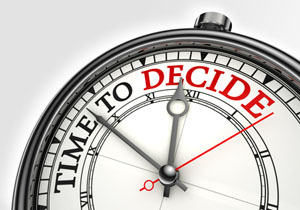 In various conversations that I have experienced over the past week, I have been very aware of people who are making decisions without thinking through the consequences and at the opposite end of the spectrum people who are seriously procrastinating and really avoiding making a decision at all, at all. On more than one occasion I have found myself saying:
In various conversations that I have experienced over the past week, I have been very aware of people who are making decisions without thinking through the consequences and at the opposite end of the spectrum people who are seriously procrastinating and really avoiding making a decision at all, at all. On more than one occasion I have found myself saying:
“Nobody sets out to make a bad decision”
The first time I came across this statement, I found it very powerful. We all make decisions each day. They can vary from the mundane “what clothes will I wear?” or “Will I eat that second helping of dessert?” to considerably more serious such as “Will I take this job offer?” “Will I leave my partner?”
The reality of decision making for many people is that we make decisions based on the best information that we have at the time. It may happen that the decision we make has negative consequences but we do not set out to experience those negative consequences.
What is important is that we actually understand the process by which we make decisions. I gather some information and then look for supporting evidence. I have a tendency to only focus on things that support my already half made decision. My husband generally looks for the opposing argument, which for big decisions can be really helpful. I find what is right, he seeks out what is wrong and generally we find the middle ground that suits us both. It works for us.
It is important to understand our own decision making processes and so my challenge to you this week is to consider you own decision making processes. I do believe that it is better to focus on the good decision processes rather than those that resulted in negative consequences. And so my challenge to you it to take time this week to consider the processes that you went through for some decisions that you have made in the past year that are turning out to be good decisions.
Did you make the decision alone or did you bounce your considerations off others? Did you only seek evidence to support your decision or did you seek out contrary arguments? How did you decide that you had enough information to make a decision?
And finally how do you want to use this knowledge to support good decision making in the future?
Mary Corbett is a founder member of Parenting Club, author, life and business coach and mother of 2 busy children aged 12 and 17.
